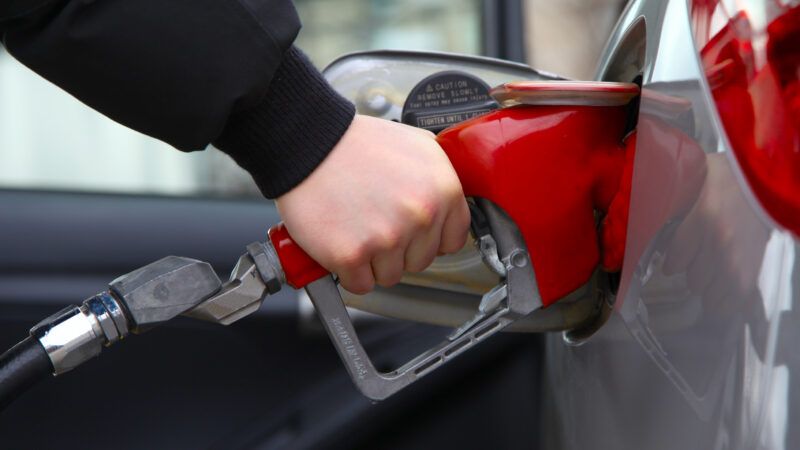The Gas Tax Makes Sense. Biden Considers Canceling It.
Road maintenance and construction don't suddenly become free because gas hits $5 a gallon.

The gas tax is the one good tax, so it makes sense that it would also be the only one that President Joe Biden is considering suspending.
"I hope I have a decision based on data I'm looking for by the end of the week," the president told reporters on Monday on whether he'd support a federal gas tax holiday. Suspending the 18-cent per gallon federal tax on gas would obviously require some votes in Congress. Biden's final "decision" on whether to call for that congressional action really just boils down to whether he thinks it's politically prudent.
The declaration of gas tax holidays in states both red and blue suggests that it'd be a popular idea, particularly when a gallon is averaging close to $5 nationwide. Five states, including Florida and New York, have suspended their gas tax already, notes CNET—a move that's supported by 72 percent of respondents in a recent Politico/Morning Consult poll.
Sens. Maggie Hassan (D–N.H.) and Mark Kelly (D–Ariz.) introduced legislation back in February to suspend the federal gas tax through December 2022.
Senate Minority Leader Mitch McConnell (R–Ky.) threw cold water on that idea at the time, saying then that "Democrats want to blow a $20 billion hole in highway funding so they can try to mask the effects of their own liberal policies on working Americans."
Gas was under $4 a gallon then. Perhaps today's higher prices still will prompt national Republicans to follow their state-level partisan allies and get on board with a gas tax holiday.
Even if that's the popular political move, it would certainly be bad policy. People hate taxes and rightly so. But the federal gas tax is more appropriately thought of as a user fee that charges people for a service they consume.
Fuel taxes paid by motorists are collected in the federal Highway Trust Fund, which is then spent building and maintaining the roads and bridges those same drivers use. The federal gas taxes, excluding the tax on diesel, make up about 60 percent of tax revenue dedicated to the Highway Trust Fund.
Fairness demands charging drivers for the roads. The only alternative would be to require nonmotorists to subsidize driving infrastructure for them.
A user fee-like fuel tax also keeps road spending in line with demand for roads. It's harder to fund bridges to nowhere if people's fuel consumption, and the taxes they pay on it, aren't generating enough revenue for new projects.
Suspending the gas tax, therefore, makes road spending less fair and less efficient. It would also be fiscally costly. Road construction and maintenance don't become free just because gas prices are high. Suspending the gas tax only gives road users a break from paying for it.
If the tax holiday were accompanied by a highway spending holiday, of sorts, perhaps that could be justified. But the proposal from Hassan and Kelly replaces every last dollar of lost gas tax revenue with general fund revenue. That means nondriving taxpayers are now on the hook for that spending instead.
Worse, a gas tax holiday would further untether the increasingly tenuous connection between gas taxes and road spending—setting the stage for more subsidies and spending still.
In the good old days, federal highway spending was entirely covered by gas tax revenues. In recent decades, growing federal road and transit spending and slower-rising gas tax revenue have meant that the Highway Trust Fund has required repeated transfers from the general fund.
In 2008–20, Congress shifted $155 billion in general fund revenue to the Highway Trust Fund. The infrastructure law Biden signed in November 2021 transferred another $118 billion of general fund revenue into the highway fund, both to stave off impending insolvency and pay for massive new road spending.
Suspending the gas tax would completely transform road spending, albeit temporarily, into a federally subsidized transfer program.
To be sure, the federal gas tax is an imperfect user fee. A portion of gas tax revenue is diverted to public transit projects that drivers won't use. They also might be paying for roads that they don't drive on. Fuel consumption is an imperfect proxy for how much wear and tear individual drivers are putting on roads. That means electric vehicles and heavy trucks are undertaxed in this regard.
This reality recommends making the gas tax more like a user fee or even replacing it with a mileage-based fee that could more precisely charge drivers for what they use. That policy isn't quite ready for the prime time yet—there are a lot of logistical, technological, and privacy issues to work out—but it's the direction transportation policy should be moving in.
A gas tax holiday is a step in the wrong direction.
Rent Free is a weekly newsletter from Christian Britschgi on urbanism and the fight for less regulation, more housing, more property rights, and more freedom in America's cities.


Show Comments (74)